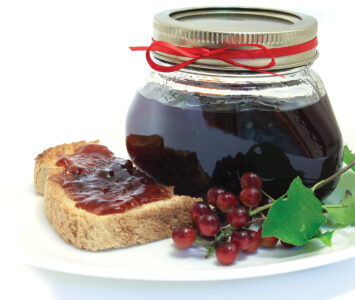Learn about different types of farm fencing and energizer options before installing a well-built fence to add value and security to your land.
You’ve got a piece of land and a dream to keep some livestock, but your place doesn’t have good fences — not yet, anyway. Many types of fences are available, and installing a fence is a job you can do yourself.
Fencing can range from about $200 to $1,500 per quarter mile (1,320 feet), but your selection criteria will involve more than just the cost. Your choice should be based on the livestock you want, the terrain of your land, the life span of various fencing options and the amount of effort and tools it will take to build and maintain each type.
Fencing options include woven, barbed and high-tensile (both electrified and nonelectric) wire. Electrified poly wire/poly tape is another possibility, but for large livestock it’s only effective for temporary applications within permanently fenced fields. Typical fences are about 5 feet high, though any height is possible — I have a 7-foot-tall electric fence to keep out deer. The approximate material costs that follow are based on information taken from a July 2005 Iowa State University Extension report about livestock fencing (go to the Iowa State University Extension website and search for “fencing costs”).
Woven Wire Fence
Installation: about $1,500/quarter mile with a single strand of barbed wire on top; alternating between wooden posts and metal T-posts spaced 12 to 16 feet apart. (In most locations, you won’t need nearly so many wooden posts — maybe two for every quarter mile.) About 40 hours of labor
Ongoing maintenance: replacing and resetting staples, retensioning corners
Pros: strong, secure and relatively attractive; confines nearly all livestock, including sheep and goats
Cons: highest initial cost, most maintenance required
Sometimes called “page wire” fencing, this system uses the same kind of wood and metal posts common to other fencing types. Corner/end posts generally are about 8 feet long, at least 8 inches in diameter and need to be specially braced. Wooden line posts are at least 4 inches in diameter and should be installed along a taut string to ensure accurate alignment. Posts should go about 3 feet into the ground, every 12 to 16 feet.
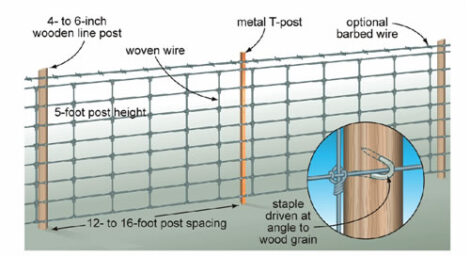
One of the most challenging parts of installing a fence is digging all those postholes. To save time digging them, you can forego most of your wooden posts for metal T-posts — lightweight metal beams that can be driven into the ground with a post pounder (which you can make easily, see Fantastic Fencing Tools). Metal T-posts have either predrilled holes at various places down their length or a series of raised bumps running down their length. The predrilled holes are perfect for attaching woven and barbed wire fences. Thread a 10- to 12-inch piece of 12.5-gauge fence wire through one of the holes and then give it three or four wraps around the woven or barbed wire on each side of the post. The posts with raised bumps are designed to be used with heavy wire clips that hold the wire tight against the flat face of the posts. T-posts don’t resist the pull of a tight fence wire, but they can hold it upright and won’t significantly compromise the strength of your fence.
Handling the heavy rolls of woven wire is a job for two people. To put up woven wire, install all posts and then unroll enough woven wire to span the straight length from one corner to the next. Wrap the woven wire around one wooden end post, cut most of the vertical wires and wrap the horizontal wires back along their own length so that the fence itself is tied around the post. Then secure it with U-shaped fence staples driven in with a hammer. Pull the wire tight with the help of a mechanical fence stretcher and then wrap the woven wire around the second wooden end post, wrapping and fastening as you did on the other end. As you walk back along the fence line, secure the taut woven wire to any intervening wooden fence posts with more staples and to the metal T-posts with wire. A single strand of barbed wire installed above the woven wire will help the fence last longer because it deters animals — especially cattle and horses — from rubbing on it.
If your land is stony or hard, then consider high-tensile electric fencing (see “High-Tensile Electric Fence” later in this article), which can be installed with fewer posts. Woven wire may be the hardest to install and maintain, but it gives you a great, long-lasting fence for your money. Woven wire is the kind of permanent, reliable fencing that is the industry standard for containing cattle, sheep, goats and horses.
Different Types of Farm Fencing: Barbed Wire Fence
Installation: about $1,100/quarter mile for either three strands of wire at 14-inch intervals, or four strands of wire at 10- to 12-inch intervals; alternating between wooden posts and metal T-posts spaced 12 to 16 feet apart. About 40 hours of labor
Ongoing maintenance: retensioning barbed wire and mending breaks; retightening corner assemblies
Pros: lighter and less expensive to install than woven wire, and a greater physical deterrent to cattle, which generally try to push unbarbed fences down
Cons: aggressive appearance; can be dangerous for children, livestock and wildlife; not adequate for containing sheep and goats
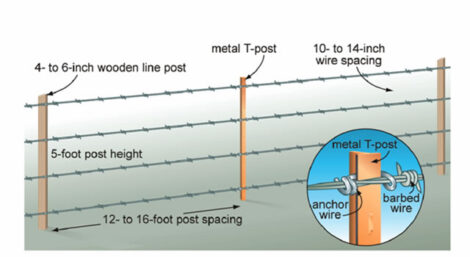
Barbed wire fencing begins with the same post arrangement as woven wire fencing, but it’s easier to install because it does not require you to handle large rolls of woven wire. You just pull the strand of barbed wire off the spool, pull it tight across end posts and then staple or wire it to your line posts. That said, barbed wire does “bite” — that’s its purpose, and it’s easy to scratch and cut yourself while working with this stuff, so always wear leather work gloves. Barbed wire is especially appropriate for containing cattle — the animals most likely to push hard against a fence that doesn’t bite back.
Although you’ll use the same arrangement of corner and line posts as you would with a woven wire fence, the cost of installation and the amount of maintenance for barbed wire fencing are somewhat lower. Barbed wire also is much easier to install over rolling terrain because the wires follow the land’s contour. Woven wire, on the other hand, buckles if you try to install it over steep hills and gullies. The life expectancy of a barbed wire fence is the same as a woven wire fence, about 20 years.
High-Tensile Nonelectric Wire Fence
Installation: about $1,000/quarter mile for eight strands of nonelectric wire (number of wires needed may vary); wooden posts and metal T-posts are spaced 20 to 30 feet apart. About 30 hours of labor
Ongoing maintenance: retensioning wires, reinstalling wire anchors and retightening corner braces
Pros: easy installation and maintenance; attractive appearance
Con: Not appropriate for any livestock except horses and mules. Goats and sheep will crawl through; cattle will push through, unless you use barbed wire.
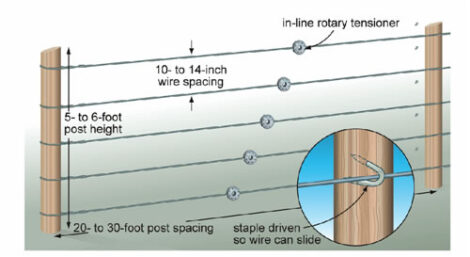
In this approach, smooth 12.5-gauge wire (sometimes barbed wire, too) is loosely fastened to posts that offer vertical support, but still permit the wires to slide back and forth. This allows for easy retensioning of the fence wires and helps to better contain animals — when they hit the fence, a whipping action occurs that discourages future encounters. Support posts can be placed farther apart than with woven and barbed wire fences, though only where the land is flat. You’ll need more frequent post placement to make the wire conform to the undulations of a rolling landscape.
Smooth or barbed wire is anchored at each of the end/corner posts and then tightened with a rotary tensioner that allows you to specify the amount of pull for each wire. It’s easy and foolproof, except for one thing: Too much tension places unnecessary strain on end/corner posts.
Different Types of Farm Fencing: High-Tensile Electric Fence
Installation: about $700/quarter mile for four strands of wire at 12- to 16-inch intervals; posts spaced 25- to 60-feet apart. About 20 hours of labor
Ongoing maintenance: retensioning wires, replacing insulators, adjusting corners and checking chargers and ground rods
Pros: easiest and least expensive to install; lowest annual cost of ownership; good containment performance for almost any livestock
Cons: most technically complex fence; requires regular monitoring; if not protected, energizer can be ruined by a lightning strike; will shock people and pets
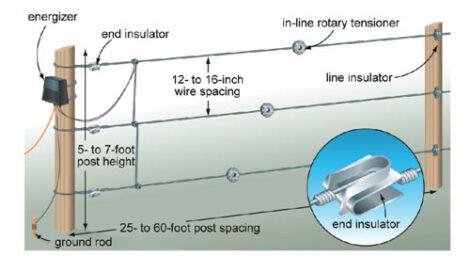
For many homesteaders, high-tensile electric fencing is an ideal choice. It’s the least expensive perimeter fencing to install, with the lowest level of ongoing maintenance required over its expected 25-year life span. High-tensile electric fencing also is the easiest to install if you don’t have access to specialized fencing tools such as a posthole auger. That’s because post spacing can be farther than that of other fencing types, and you can use metal T-posts in most places.
High-tensile electric fence installations are similar to their nonelectric cousins, the only differences are that fewer fence posts and wires are necessary and the electricity takes the place of barbs in discouraging animals from pushing down the fence. The wires are supported differently — because the entire system is electrified — by line and end insulators that keep the electrified fence wires from short-circuiting. To give the fence its electric shock, you’ll need an energizer, which costs about $200, and ground rods to complete the circuit.
Lightweight Electrified Poly Wire/Poly Tape
Installation: about $200/quarter mile for a 30-inch-high poly wire mesh. About two hours of labor
Ongoing maintenance: retying broken poly wire, straightening metal T-posts, maintaining ground connection
Pros: easy and inexpensive to install and move; some versions repel predators
Cons: not suitable perimeter fencing for large livestock; will shock people and pets
Available in different patterns, strands of wire are interwoven in a polyethylene plastic rope mesh that resembles a woven wire fence. This combination provides a physical barrier as well as delivery of electricity close to the ground. It’s the easiest and least expensive fencing option, but there’s a catch: Most light-duty poly systems aren’t considered reliable for perimeter fencing for large livestock. That’s because they’re generally positioned too low to the ground and are too weak to keep large animals off a road or out of a neighbor’s flower garden. But for internal fencing, they’re nimble enough that you can move them for rotational grazing or other temporary fencing needs. It also provides an effective deterrent against most predators.
Woven poly mesh is a useful option for containing poultry and keeping small animals such as rabbits and raccoons out of the vegetable garden. If you combine a poly fencing system with electrified high-tensile perimeter fencing, you don’t need to buy a second energizer. Simply hook up the small poly fence to your existing high-tensile electric fence to electrify both using the same charger.
Choosing and Using an Energizer
The power running through an electric fence is different than the electricity that comes out of a wall socket or a battery, and creating this unique power is accomplished with an energizer. Also called a “fencer” or “charger,” this device takes relatively low-voltage electricity and increases it to between 2,000 to 10,000 volts at the fence wire, with a corresponding drop in amperage that makes the system safe. The result is a lively bunch of electrons that are eager to make their way back to the earth via anything that touches the fence wire. When the electricity passes through a cow or a horse (or a homesteader!), there’s no question what happens — the result is shocking indeed!
You need to consider two vital issues when selecting an energizer. First you should choose an appropriately powerful model for the animals you want to contain or exclude. Your energizer’s power output is rated in “joules.”
The second fundamental issue is grounding. You can have the best energizer in the world, but it’s useless without a functioning electrical connection to the earth. This is a crucial and often overlooked detail that can impair the performance of any electric fence. You should use a minimum of two metal ground rods driven into the soil for each energizer in your system. For optimal energizer performance in most soil conditions, use three-fourths-inch-diameter, 3-foot-long galvanized steel rods. You may need more rods in dry earth because it is less conductive.
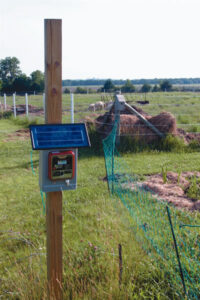
To install ground rods, pound them into the ground so only 6 inches of metal remains above the earth. Connect the rods together with 12-gauge high-voltage insulated wire, with another run of wire back to the ground terminal of your energizer. Solar chargers are available if you don’t want to trade out batteries.
When an animal touches the energized fence, it completes a circuit to the earth that allows electrons to flow through its body, creating the shock sensation. But without an effective low-resistance connection to the ground, the circuit cannot be completed. To find out if an electric fence is working, tear off a wide blade of grass and hold it against the fence wire. If it’s live, you’ll feel a pulsating, tingly feeling.
Don’t worry that tall pasture will cause the fence to short out. The power output and electric circuitry of modern energizers allow them to function properly even when some grass is touching the fence. If your pasture is particularly lush and you’re concerned about power loss through wet vegetation, then consider using a detachable bottom wire. Keep it energized when the grass is low in the spring and disconnect it from the system as the grass grows higher. In areas where the ground is dry or where animals will be walking on snow (which is a fair insulator), consider grounded fence wires. These can alternate between the live wires of your fence or simply be used along the bottom. Either way, they allow the fence to deliver a shock even when an animal isn’t well grounded.
Fences are a key component of success with livestock. Take the time to choose and build the best possible fencing, and you’ll take a big step to making self-reliance a reality on your land.
Different Types of Farm Fencing: Wooden Versus Plastic Posts
Wooden fence posts are inexpensive and easy to find in forested regions. They’re also lightweight and a pleasure to cut, drill, nail and staple. So why use anything else? One reason is durability.
Even the legendary longevity of cedar and black locust won’t stop rot from attacking wooden fence posts and eventually bringing them down. The problem is especially bad at ground level, where factors that cause rot are most vigorous. This is why various manufacturers offer recycled plastic fence posts, which are impervious to harmful ultraviolet light and moisture.
Plastic fence posts can be cut and worked the same way as wood. However, they generally are more expensive than wooden ones, and they’re not as strong or rigid. This means you can’t always expect plastic posts to stay straight.
Read more: Learn about three different types of sturdy corners for perimeter fencing in Sturdy Corner Posts: Resisting the Pull.
Originally published as “Fencing for the Homestead” in the February/March 2006 issue of MOTHER EARTH NEWS.



